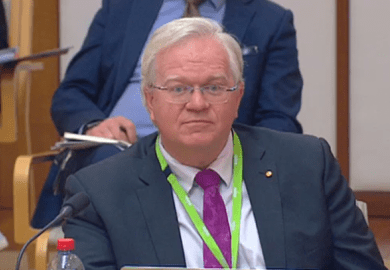“Team Australia” risks degenerating into “fortress Australia”, as fears about collaboration put an end to research in the global interest, a Canberra symposium has heard.
Chief defence scientist Tanya Monro told the Universities Australia conference that changing global circumstances had increased the appetite for “enhanced mutual reliance” among allies. “If we don’t make that come alive in research, we’ve lost a huge opportunity for our nation,” said Professor Monro, a member of the University Foreign Interference Taskforce (UFIT) steering group.
“We need to…make it easier for our academics to work with allied nations, especially in critical and sensitive tech areas. It is a team Australia approach, not a fortress Australia approach.”
The UFIT guidelines are being updated this year. La Trobe University vice-chancellor John Dewar, who is also on the steering group, cited concerns that the government’s focus on university research arrangements was having a “chilling effect” on “low-risk” collaborations. “How do we balance security concerns with preserving free and open collaboration?” he asked.
University of Newcastle vice-chancellor Alex Zelinsky, a former chief defence scientist and fellow UFIT steering group member, warned against disengaging with countries like China in areas such as climate change. “Some areas we work with [them]; other areas we don’t,” he said. “That’s being strategic. There are just certain areas which are sensitive, and we should try to avoid them.”
Bronwyn Harch, deputy vice-chancellor of the University of Queensland, said UFIT had not affected the “vast majority” of its research activity. “There’s a small number of activities that require some extra due diligence,” she told the conference. “And there’s a very small number of areas that we have decided to not pursue based on UFIT guidelines.”
Professor Harch stressed the need to evaluate research risks on a “case by case” basis, and for university administrators to manage risks so that researchers did not “self-censor by default”. She said that international partners were avoiding lengthy agreement renewals as they adopted a wait-and-see approach.
“They’re watching the geopolitical landscape,” she said. “Some of our partners are interested in our supervisors’ citizenship and residency status as well, particularly when they’re working in areas of sensitive research.”
Patrick Hallinan, deputy to UFIT steering group chair Chris Teal, said there would be “fulsome consultation” with universities on the “refresh” of the guidelines. “We need to…get reactions to the areas of different emphasis that we might seek to pursue,” said Mr Hallinan, who is acting deputy counter foreign interference coordinator with the Department of Home Affairs.
“When borders reopen and researchers are engaging more directly once again with their international counterparts, I don’t think it will only be Australian researchers who are talking and thinking about these issues. This is part of a broader shift in the research community. How do we best balance the risks and benefits associated with international collaboration so it’s not about precluding such collaboration?”
Mr Hallinan said that the UFIT guidelines were not the only thing under review, with a parliamentary joint committee also looking at intelligence and security issues, while a bill before parliament seeks to bring universities under the purview of the Security of Critical Infrastructure Act.
“The act was only passed into law in 2018,” he said. “It is telling that it’s necessary to revisit that now…if you need to be convinced that the world is changing rapidly.”
Register to continue
Why register?
- Registration is free and only takes a moment
- Once registered, you can read 3 articles a month
- Sign up for our newsletter
Subscribe
Or subscribe for unlimited access to:
- Unlimited access to news, views, insights & reviews
- Digital editions
- Digital access to THE’s university and college rankings analysis
Already registered or a current subscriber?










